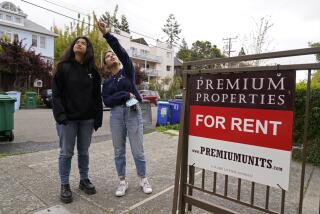FCC Chairman’s Speech to Industry : Phone Charges Must Go Up, Fowler Warns
Residential telephone customers may find their service largely unaffected by the breakup of the Bell System nearly two years ago, but that attitude may stem from the fact that they have yet to pay the breakup’s full cost.
Meeting with telephone industry executives in San Antonio last week, Federal Communications Commission Chairman Mark S. Fowler agreed that phone rates must be pegged more closely to the cost of providing service--meaning they must go up if good-quality service is to be maintained.
If that is done, the basic residential bills will have to increase substantially while charges that long-distance carriers pay local phone companies for access to their local networks will have to drop sharply.
If that is not done, Fowler warned, long-distance carriers and their major customers will have a strong economic incentive to bypass local telephone networks entirely to avoid charges that they consider excessive.
During the meeting of the U.S. Telephone Assn., the trade organization released Wednesday a nationwide survey that it had commissioned from the Gallup Organization. The survey indicated, among other results, that two out of three telephone customers believe that the breakup of AT&T; has not affected local telephone service.
Costs starting rising for the consumer last June, when the FCC imposed a $1 “interstate access charge” on residential customers as a first step in increasing their contribution toward paying the cost of maintaining the basic local network. These are the costs of providing customers with a dial tone, regardless of how many calls they then place.
That $1 charge will double next year, Fowler noted--and that won’t be the end. “Even after subscriber line charges are raised to $2 per month in 1986,” he said, “we still must ‘deload’ toll rates further, one way or another.”
In addition, some state regulators--though not yet the California Public Utilities Commission--have imposed their own versions of the FCC “access charge.” Pacific Bell has asked the PUC to shift $232 million in access charges paid by long-distance carriers to residential customers, and it says another $600 million should be shifted from the long-distance carriers that it serves to its residential customers’ bills.
The breakup of the Bell System forced regulators to create access charges to replace internal subsidies that American Telephone & Telegraph Co. was able to use to keep local residential rates low before it gave up its local phone companies to settle an antitrust lawsuit. Under the monopoly Bell System, regulators could peg some services--such as long-distance calling and Yellow Pages advertising--well above their cost in order to pay part of the cost of local residential service. Now, with that system gone and AT&T; competing for long-distance customers, inflated charges are no longer possible.
‘Great Resistance’
“Not surprisingly, there has been great resistance to increasing local rates, even on a gradual basis,” acknowledged John E. Hayes Jr., Southwestern Bell’s vice president for revenues and public affairs. But Hayes called this resistance “short-sighted,” explaining: “Upward pressure on local rates will be tremendous, once large customers abandon the public network in favor of . . . bypass options.” In other words, if major telecommunications users leave the system, an increasingly large share of its costs will be borne by residential and small business customers who cannot take advantage of “bypass options.”
But the incentives for major telecommunications users to bypass local networks are real and are already cutting into revenues of local phone companies, Hayes said.
As an example, he said long-distance carriers must pay 7 cents a minute to local phone companies to originate and complete calls--far more than it costs the local companies to provide that service. By leasing a private line, these carriers can reduce that charge to a few cents a minute. And if they bypass the local network entirely by building their own switches serving their most important customers, their cost drops to 0.3 cent a minute, Hayes said.
“Being prudent business people,” the long-distance carriers will take advantage of the cost savings of bypassing the local network unless all rates--commercial as well as residential--are geared to cost, Hayes said. “In fact, a casual observation reveals the (long-distance) carriers positioning themselves now to offer equipment and services that provide the ability to bypass.”
Justice Department Criticized
The Department of Justice, which brought the antitrust suit that led to AT&T;’s divestiture, continues to hamper the transition to a competitive, less-regulated telecommunications environment, charged William L. Weiss, chairman and chief executive of Ameritech, the Chicago-based regional holding company created to take over a handful of Midwestern Bell operating companies.
The department “stifles the very competition” that divestiture was intended to encourage, Weiss said.
“The Department of Justice has simply added one more layer of pervasive regulation,” Weiss said. He chided department lawyers for “anti-competitive behavior” stemming from an “outdated” view that local phone companies continue to operate as “a bottleneck monopoly.”
“Anyone who contends that today ought to visit my office in Chicago,” Weiss said. “I can look out the window in any direction and see microwave dishes all over the place.” These are replacing services formerly provided by Ameritech, he said.
In addition, competition has entered the local market, he said. Old freight tunnels that lace through Chicago’s Loop are being converted to an alternative local telecommunications network able to interconnect most of the city’s major buildings. And in many of those buildings, tenants can now share private systems that will eventually be linked to neighboring buildings and even to long-distance carriers, bypassing Ameritech’s facilities completely.
If that happens on a large scale, there will be that much less revenue to pay for upkeep and development of the public local network, he warned.






